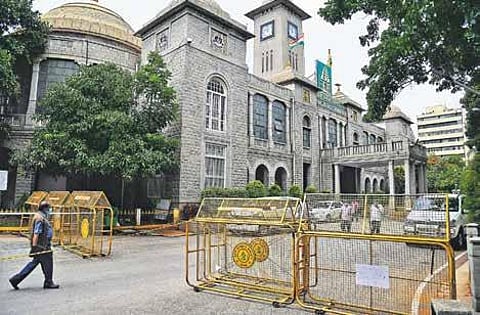The Bengaluru Nava Nirmana Party (BNP) has launched a scathing attack on the Karnataka government over what it terms a “deeply flawed” ward delimitation exercise in Bengaluru. The party claims that the process was carried out without transparency, fairness, or consideration for ground realities. According to BNP, several wards have been demarcated in ways that defy logic, with uneven population distribution and arbitrary boundaries causing widespread confusion. The party argues that such a flawed exercise undermines the democratic process at the grassroots level, limiting the fair representation of citizens.
BNP leaders accused the government of manipulating the process for political gain. They alleged that the delimitation favors ruling party strongholds while diluting opposition-leaning wards. This, they claimed, distorts electoral fairness and directly affects how resources are distributed across the city. The party highlighted cases where certain wards with fewer residents were given equal representation as those with much larger populations, thereby violating the principle of equality in electoral divisions. Such anomalies, BNP argued, will worsen the imbalance in civic governance and service delivery in a city already struggling with urban chaos.
Residents, too, have voiced frustration with the new ward boundaries. Civic groups pointed out that the delimitation splits established neighborhoods, leaving residents confused about their jurisdiction, councillors, and grievance redressal channels. For a city facing issues ranging from garbage management to water scarcity, such administrative confusion adds to the burden on citizens. BNP insisted that the exercise must be revisited through a consultative and scientific process involving urban planners, citizens’ representatives, and demography experts rather than opaque decisions made by political actors.
BNP has also highlighted the risk of long-term political consequences if the delimitation is not corrected. Misaligned wards could entrench advantages for certain parties, making it harder for opposition voices to be heard in local governance. Analysts warn that over time, this could reduce competition, weaken accountability, and discourage civic engagement. Citizens may feel their votes carry less weight, undermining trust in democratic processes at the municipal level.
Legal scholars have pointed out that similar cases in other Indian cities have led to court-mandated redrawing of ward boundaries. BNP suggests that the Karnataka government should proactively revise the delimitation using transparent criteria to avoid litigation, protests, and administrative delays. Such preventive action could preserve both citizen confidence and electoral integrity, preventing the situation from escalating into a prolonged legal and political battle.
Community groups have also voiced concerns over civic planning and resource allocation under the current delimitation. Unequal wards may lead to discrepancies in public services such as sanitation, water distribution, street lighting, and road maintenance. BNP emphasizes that fair representation is not just a matter of electoral fairness but directly impacts the quality of life for residents, as councillors in oversized wards may struggle to address all constituent needs effectively.
In conclusion, BNP’s sustained criticism underscores the urgent need for a transparent, scientifically guided, and participatory ward delimitation process in Bengaluru. Citizens, experts, and opposition parties are united in calling for an immediate review. The government is being urged to ensure fairness, equality, and accountability, guaranteeing that every voter and community receives proper representation. Failure to act, BNP warns, could have lasting political, social, and administrative repercussions for India’s fastest-growing city.
Concerns Raised by Citizens and Civic Groups
Civil society organizations have expressed concern that flawed delimitation could erode trust in local governance. They stressed that ward boundaries should reflect population density, community identity, and service delivery efficiency. Instead, they argue, the current delimitation ignores these principles, making Bengaluru’s civic administration more fragmented and inefficient.
Experts have also noted that arbitrary delimitation can lead to unequal workloads for elected representatives. In larger wards, councillors may find it impossible to manage constituent demands effectively, while smaller wards could receive disproportionate attention and funding.

Call for Review and Transparency
BNP has demanded that the government immediately halt the implementation of the delimitation order and engage in a public consultation process. The party has threatened to escalate protests if corrective measures are not taken swiftly. They insist that fair representation is fundamental to Bengaluru’s democratic governance and cannot be compromised for political convenience.
The BNP has stressed that ward delimitation is a crucial foundation of local democracy, ensuring that every citizen’s vote carries equal weight. They argue that arbitrary or politically motivated demarcation undermines public faith in governance structures. By allegedly favoring certain areas over others, the government risks creating pockets of over-representation and under-representation, which could skew decision-making and resource allocation in favor of politically preferred zones. BNP leaders insist that fairness and neutrality must guide any delimitation exercise.
Urban planning experts have highlighted that Bengaluru has witnessed rapid demographic shifts in the past decade, with large influxes of migrants to peripheral areas. Many new localities are underrepresented under the current delimitation, while older wards retain disproportionate influence. This mismatch, they say, could exacerbate existing service delivery gaps, such as in water supply, waste management, and road maintenance. Correcting these distortions, experts argue, requires using up-to-date population data and geospatial analysis.
Civic groups have joined BNP’s criticism, noting that several neighborhoods are being split across multiple wards without logical continuity. Such divisions, they argue, complicate civic administration, as citizens are unsure which councillor to approach for grievances. Reports indicate that some residents have received conflicting notices regarding their wards, highlighting the lack of clarity in communication from authorities. BNP claims that this administrative confusion reflects the hurried and non-transparent approach of the government.
BNP leaders have also raised concerns about potential gerrymandering. They allege that the ruling party could have influenced the delimitation to consolidate its electoral base, weaken opposition support, and marginalize dissenting communities. Opposition analysts support this view, noting that several wards with historical opposition support appear to have been merged or fragmented in ways that could dilute their electoral strength. Such tactics, BNP insists, threaten the democratic ethos of Bengaluru.
Political analysts warn that flawed delimitation could impact the city’s governance for years. Bengaluru is facing numerous civic challenges, including traffic congestion, flooding, and waste management crises. If councillors are assigned disproportionate or ill-defined constituencies, it could hamper accountability and responsiveness, making it difficult to address urban problems efficiently. Experts argue that equitable ward boundaries are essential to ensure that every citizen receives adequate representation and access to municipal services.
Residents in newly demarcated wards have expressed confusion over property tax jurisdictions, water supply responsibilities, and local grievance channels. Many report visiting multiple offices without clear guidance on which ward or councillor handles their issues. BNP has highlighted these challenges, arguing that the current delimitation could erode public confidence in governance and reduce citizen participation in civic processes.
BNP has urged the state government to conduct an independent review involving urban planners, demographers, and citizen representatives. They argue that transparency is critical to restoring trust. The party proposes publishing detailed maps, population data, and rationale for each ward’s boundaries, allowing public scrutiny and feedback. Such measures, BNP says, would prevent arbitrary or politically motivated decisions and create a more accountable system.

Legal experts have weighed in on the matter, noting that ward delimitation is governed by municipal acts and constitutional provisions ensuring equality of representation. They argue that failure to adhere to legal standards could invite judicial intervention. BNP has indicated that it is prepared to approach the courts if necessary to challenge the current delimitation, asserting that citizens’ democratic rights are being compromised.
Some community leaders have also raised concerns about representation for marginalized sections, including backward classes, minorities, and women. They argue that the new ward divisions may reduce their electoral influence, limiting the ability of marginalized groups to elect candidates who genuinely represent their interests. BNP highlights that such outcomes could deepen existing social inequalities in civic participation.
Experts emphasize that rapid urbanization in Bengaluru necessitates periodic and scientifically conducted ward delimitation. Ignoring demographic changes, BNP says, risks creating systemic imbalances in civic governance. Cities evolve, populations shift, and municipal authorities must ensure that representation keeps pace with these changes. BNP stresses that failure to conduct an accurate and transparent delimitation process can have cascading consequences for governance, public service delivery, and citizen trust.
BNP has also criticized the state’s communication strategy, arguing that citizens were not adequately consulted before finalizing the delimitation. Public hearings, notices, and online platforms, which could have allowed feedback, were reportedly limited or poorly advertised. BNP claims that this lack of engagement violates the principle of participatory governance and leaves citizens feeling sidelined in decisions that directly affect their neighborhoods.
Opposition parties have joined BNP in denouncing the delimitation exercise. They argue that it reflects a top-down approach where political expediency trumps fairness. Analysts suggest that if corrective measures are not taken promptly, the issue could become a major flashpoint in upcoming municipal elections. Electoral irregularities stemming from poorly designed wards, BNP warns, could lead to litigation, protests, and political instability at the civic level.
Urban governance experts stress that Bengaluru’s municipal corporation already struggles with financial and administrative challenges. BNP argues that flawed ward boundaries would exacerbate these problems, making it harder to allocate resources equitably across wards. Unequal representation could also result in some areas receiving more funding and development projects than others, deepening existing disparities and fuelling citizen discontent.

BNP has promised sustained protests and public campaigns until the government revises the delimitation exercise. They plan to organize citizen awareness drives, legal petitions, and media campaigns to highlight the flaws in the current system. The party argues that democratic accountability requires vigilance from both political entities and ordinary citizens, ensuring that administrative exercises like ward delimitation uphold fairness, transparency, and the principle of equal representation for all residents.
Follow: Karnataka Government
Also read: Home | Channel 6 Network – Latest News, Breaking Updates: Politics, Business, Tech & More

